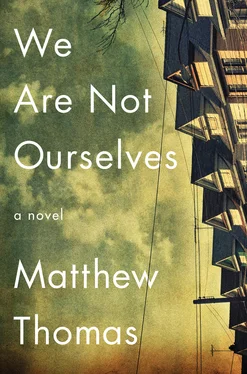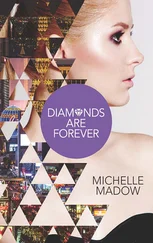“What about our rainy day savings?” Ed asked when he saw it.
“If it rains any harder than this,” she said, “not even Noah’s Ark would save us.”
• • •
The weather was too warm for her new coat, but the Saturday after she’d bought it was chilly, and she decided that this might be the last chance she’d have to put it on for half a year. She made a reservation for seven o’clock at Le Bistro on Pondfield, the fancy place across from the post office that she’d been wanting to go to for months. She and Ed parked a few blocks up, where Kraft met Pondfield, because she wanted to take a little stroll through town and be seen. As soon as she started walking, though, she felt overdressed. No one else was in fur, and the truth was that she hadn’t seen many women her age in fur since she’d moved.
By the time they reached the restaurant, she’d worked up such a sweat that she took it off before she went in. She’d had a vision of the maitre d’ taking it from her shoulders slowly, one arm at a time. It was heavy enough in her arms to feel like a sleeping child. She handed it over, hoping no one would see the transfer. She would have to try again next winter.
For as long as she could remember, she’d wanted to wear a mink coat. Women in minks always looked as if they had no problems in the world. She’d spent her own good money on it — the credit card payment, in the end, came from her own money. She’d pay it off as soon as the bills settled down. She was almost proud to think of how much the total had come to, even after the off-season discount had been factored in.
Connell’s uncle Phil was in from Toronto. After dinner, Connell’s father began telling a story everyone had heard before about the summer he’d spent in college doing service work in Peru. The punch line involved the drastic height differential between himself and the priest in charge.
“There I am, all six feet of me,” he said, “and—”
“You’re not six feet,” Connell interrupted. “You always say you’re six feet. You’re like five eleven.”
“I’m six feet tall,” his father said with dignity.
“You wish you were six feet.” Connell had just measured himself, and he knew he was five ten and that his father wasn’t much taller. He went over and squared up against his father back-to-back. Then he made him take his shoes off. He took off his own Doc Martens.
“Son, I’m six feet.”
“Maybe you were once,” he said. “Maybe you’re shrinking.”
“I’m not old enough to shrink.”
“Maybe you are,” he said. “Maybe you’re losing it early, Dad. It would explain a lot.”
His father gave him a quick, deadly stare. “ Enough ,” he said, and turned away. “Do you need a drink?” he said to Uncle Phil.
“I’ll come with you,” Uncle Phil said.
Connell followed them into the kitchen. “If you’re six feet,” he said, “then prove it.”
“Let it go, son,” his uncle said.
“Here,” Connell said. “The door’s right here. We’ll mark you off against it. Like we did for me in the old house.”
His father looked annoyed, but he stood against the door. Connell made him take his shoes off again.
“Five foot ten and three-quarters,” he pronounced as he made a deep score in the side of the door with the pencil.
• • •
Connell was emptying the dishwasher. He pulled up the handle of a knife whose blade had been broken off near the base. It was nothing but a stump.
“This has seen its last day,” he said, holding it up to the light. “I’m getting rid of it.”
He threw it out; his father walked over and quietly fished it from the garbage.
“That knife is guaranteed for a lifetime,” his mother said with matter-of-fact triumph. “That’s a high-quality knife.”
“I can tell,” Connell said archly.
His father rubbed the handle between his fingers like a worry stone.
“I’ve been meaning to call that company for a while now,” his mother said.
Connell was incredulous. “Can we just get rid of it? You’re not going to call the company. What could you possibly do with that knife, Dad? Seriously.” He strained for a tone he would take with a father he could spar with, a tone he knew would hurt him.
“You’d be surprised,” his father said. “I use this knife to stir my sauces.”
“I am too going to call that company,” his mother said. “They’ll honor their guarantee.”
“We have plenty of other knives. Why do we need this one?”
“Your father bought that knife when we got married. He spent a lot of money on it at the time. Is that enough of an answer for you?”
She looked on the verge of tears. He knew he shouldn’t have anything more to say.
“Doesn’t mean you have to keep it forever,” he said.
Eileen had helped Ed with his classwork here and there throughout the year, but as the end of the spring semester approached, she found herself grading more and more of his lab reports and tests. He looked over her shoulder, explaining things. They each took a stack and went through them, and she checked his work at the end.
For a year, he’d been gathering evidence toward a paper based on his government grant research, which he was going to present at a conference. After the diagnosis, he redoubled his efforts, staying late at the lab many nights. She knew she should have been proud of him for continuing to follow the faint trail of a fleeing ambition, and she was proud, sometimes, but she knew it would come to nothing — no new grants or appointments, no extra prestige, not even a completed paper — and she wished he were home with her instead. The nights were lonely, and it was a small compensation to imagine him sharing that loneliness with her from afar. She pictured him in his poorly lit lab, digging at his scalp as he scrutinized data skunked by faulty observations.
• • •
Ed took the study drugs twice a day. She wasn’t willing to risk his missing a dose, so she watched him swallow one every morning and every evening. After thirteen weeks, she brought him in for his first evaluation.
“I feel like one of my rats,” he told her as they sat in the attached orange chairs in the waiting room. She gave him a quizzical look. “In the lab,” he said.
“It’s not the same.”
“It is,” he said. “It’s okay, though. I can be the rat after all these years.”
“Stop that, Edmund.”
“Maybe it will help someone,” he said.
“Maybe it will help you .”
“I’m not the point of this. This is a trial. Other people are the point of this.”
“That’s not true,” she said.
“It’s fine. It’s science. I’m here for science.”
She was silent for a while.
“I’m the rat,” he said, more definitely now.
“Fine,” she said. “You’re the rat.”
“They all died eventually,” he said. “I never liked finding them stiff. It never got easier.”
She imagined the stench from the cages, the dead eyes, the reduced bodies looking like cat toys. “It must have been unpleasant,” she said.
“It was sad. It was a thankless job they had.”
• • •
They weighed him and took his vital signs, drew his blood and collected his urine, gave him an electrocardiogram and performed memory tests. They monitored his ability to do certain tasks. They had him play with blocks. They had him cut meat. They had him write things. Writing was the hardest thing to get him to do. He hated his own handwriting. It was more proof than he was willing to look at.
At the end, they handed her enough drugs to last Ed the thirteen weeks until his next scheduled visit. There was a jolt of promise in the bag of medications. She wondered for a moment whether, if she gave him the whole bag at once, he would be his old self for a few days, an afternoon, a couple of hours. It would be worth it, even if the rest of the time he was a mess. She knew it didn’t work like that, though. His real self wasn’t hiding in there waiting to be sprung for a day of freedom. This was his real self now.
Читать дальше
Конец ознакомительного отрывка
Купить книгу












